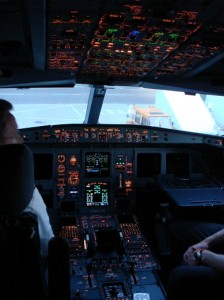The Pilot Problem and Airport Security
The PilotProblem

In fact, we should call this “the Crew Problem”, but that’s not as snappy. Simple as that. The Pilot Problem is one that most airport workers are familiar with, but security staff will probably know best what we’re talking about. Pilots (and crew) feel very strongly that they should be exempt from the security screening, based on the argument that they can “crash the plane at any time, anyway”.
While such statements of ill will would have gotten most people reprimanded, fired or jailed, that doesn’t seem to apply to pilots. Instead, this leads to a daily struggle between security staff, LEOs and aircrew, slowing down and jeopardizing the security procedures in many airports around the world.
We will admit to the fact that a pilot, if he or she so desires, is able to down the airplane he/she is piloting. That isn’t the real problem with pilots being able to skirt past security measures, however. Anyone, in any job, anywhere, might some day snap and intentionally mess up whatever they’re responsible for doing, be it screwing heads onto GI Joe dolls (sorry, “action-figures”) or running a nuclear plant. That’s not something we can ever guard ourselves completely against. The real problem that presents itself is the renewed danger that a pilot or crew member might be forced to bring illegal items onto airside.
Imagine that your family is being held hostage, and the only way for you to make sure that they come to no harm is to take 6 SMGs (submachine guns) through security at the airport you’re piloting a 737 out of first thing in the morning, and then leave those oily, nasty things with full clips in a bathroom for a nice little sleeper cell to pick up and bring on their respective 6 flights. Would you do it? Probably. Most people would – it’s a combination of several instinctive functions that we just can’t get rid of or ignore.
What is truly amazing is that the fact that it isn’t the plane-crashing which is the problem – it’s everything else – is overlooked by almost all those in a position to evaluate this risk. Those familiar with Bruce Schneier (you should be, if you’ve read this site before) will know that he is a self-proclaimed expert in all kinds of security, though having never worked in airport security, law enforcement, been a member of ASIS, held any physical security certifications, etc… He has written some books on security, and is generally seen as an authority in security – this is what he says in regards to the Pilot Problem:
I agree that it doesn’t make sense to screen pilots, that they’re at the controls of the plane and can crash it if they want to.
Bruce Schneier, here.
Well. Ignorance, it seems, has no limit. In an effort to clear this up once and for all; Crashing the plane is not the problem!
There are very few suicidal pilots, for some reason – you can check the statistics for yourself. That means that the chance that one of them suddenly decides to use that jet powered metal tube as a means to end his/her own life is very slim. The chances of someone using the pilot as a mule in order to smuggle weapons, for example, is very significant if pilots and crew can avoid the security screening.
The major problem in the reasoning that seems to pop up in most people’s mind is that the pilot/crew member is somehow a suspect, that they’re under suspicion of foul play just because they have to go through the security checkpoint. That is not so. The proper way to view pilot/crew screening is as a service to them, as well as to the passengers and in the interest of security. Somebody got your family and you’re hauling a bunch of C4 or firearms so they’ll let’em go? Fine. We’ll find the weapons, and help your family out of their predicament. Smuggling drugs because that thug down the street says he’ll get your kids when they’re walking home from school if you don’t? Fine. We’ll find the drugs and bring down a narcotics ring, get you police protection and a concealed weapons permit, for that matter.
The TSA’s decision to allow pilots to avoid the security checkpoints may cost a lot more than a few unhappy pilots, in the end. There will probably be no washing their hands of the responsibility when the day comes when a few planes come down or a hijacked with weapons brought in by a scared, held-hostage pilot just trying to protect himself or his own. It will, in fact, probably bring down the whole agency – and while some might say that that would be a good thing, it’s the path to that event which will be unacceptable.

Interesting article.
What I find perplexing is that it’s taken this long to do something in screening the crew. The Air Line Pilots Association International President Captain Lee Moak is quoted “I look forward to the full national deployment of a known crewmember program at the earliest possible date,” he continues by adding “Our nation’s airline pilots are highly skilled and trusted partners within our industry, and with this new system we can improve the screening system for flight crews while reducing congestion and improving the travel experience for passengers in TSA security lines.”
We need more positive attitudes and approaches, innovative ideas and transparency within our security & risk efforts.
Thanks, Michael.
However, we feel that screening the pilots would be a good idea, not because they’re not trusted, but because of the massive hole in security that allowing them to skirt past the checkpoints would open up.
Moak’s point about reducing congestion in security is also a bit pointless – the percentage of crew vs passengers shows that removing them from the lines will do absolutely nothing.
In the EU, crew is screened just the same as passengers (along with all other airport crew as well), which works very well, and doesn’t allow for the security holes that now exists in the US.
Just to underline the point; these “highly skilled and trusted partners” also have their weak spots, and the problem isn’t the pilot per se, but the people who might exploit them for the purpose of bringing weapons/illegal items into an airport and onto a plane.